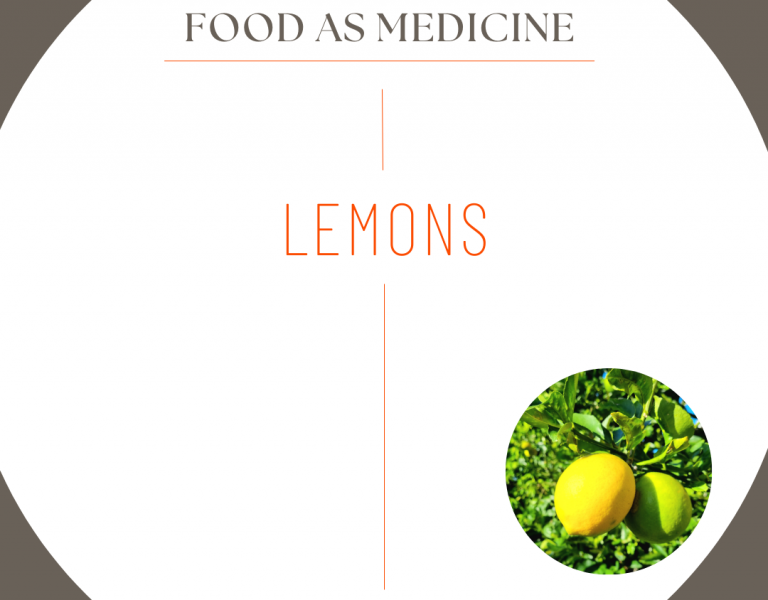
Insights Series: Healing Power of Food: Lemons.
In the spirit of my Food & Nutrition Coaching studies, I created this insights series to share some of the incredible information I learned about nutrition and the intriguing topic Food as Medicine. If you are interested in building your knowledge, please join me on Instagram or Facebook.
The unit Food as Medicine in Term 2 was extensive and focused on the concept of eating foods for disease prevention. It described whole foods, explored healing properties of specific foods or food groups from a traditional and scientific perspective while also recognising the benefits of eating local and seasonal produce.
In focus - Lemons.
Our citrus trees – which include lemons, limes, grapefruits and oranges – are laden with fruit, alas I chose lemons for the second topic of this insights series. Here are my key call out’s.
Well known for being an excellent source of Vitamin C - 4 tablespoons of juice or 59ml contain around half of the recommended daily Vitamin C intake - lemons (and limes) have a variety of health benefits:
- Strengthen the immune system due to Vitamin C and phytochemicals naringenin and hesperidin
- Antioxidant, antibiotic, vasorelaxant and antithrombotic effects
- Contain polyphenol rutin which strengthens the walls of veins and capillaries and can potentially reduce the pain and severity of varicose veins; it is also good for eye health
- Alkalising to the body
- Stimulate digestion via citric acid; appears to help normalise bowel motion, especially when constipated
- Contain citric acid which helps stave off kidney stones by reducing excretion of calcium in urine
- In vitro evidence, using a simulated model of gastrointestinal digestion, suggests that the presence of organic acids improves bioavailability of calcium from vegetables, with citric acid being the most effective, followed by tartaric acid1, malic acid2 and ascorbic acid (acidic form of Vitamin C); benefits were more pronounced for foods with low available calcium (like amaranth) than those with high available calcium (like kale)
- A squeeze of lemon in water stimulates liver activity
- Anti-inflammatory e.g. via flavonoid apigenin; one study found lemon intake may be inversely related to arthritis incidents, helping to reduce inflammatory conditions
- Regular intake has shown to reduce Cardiovascular disease
- Can treat dry mouth by stimulating saliva flow, use with caution due to the high acidity which can damage tooth enamel
- Help protect against cancer due to Vitamin C and bioflavonoids, powerful antioxidants - limonene found in the zest also helps reduce cancer risk
- Considered as a blood purifier in Aryuvedic medicine
1Tartaric acid – found naturally in tamarind, grapes, bananas, citrus, apricots, apples, sunflowers
2Malic acid - found naturally in apples, pears; used to stabilize pH/acidity of products; inhibits moulds, yeasts, bacteria
Culinary uses.
Lemon juice:
- Prevents oxidation of foods that don’t have a lot of antioxidants, thus brown easily like apples or avocados
- Add it to a meal to help pick out the other ingredients i.e. it balances flavours and/or enhances flavour of all other foods
- Can be added to boiled milk to make paneer cheese
- Starts the cooking process for raw fish/ceviche
- Can neutralise odour of fish due to acid converting the amines into non-volatile ammonium salts
- Can be used to marinate meat before cooking i.e. acid tenderises it by partially hydrolysing the tough collagen fibres.
Did you know?
Citrus peel:
- Contains limonene, a natural disease preventing compound that may help lower cholesterol and protect against cancer
- Contains more Vitamin C (ascorbic acid) than citrus flesh
- Small study supported that regular consumption may offer some protection of squamous cell carcinoma of skin >> Note findings from this study contradicts the hypothetical concern that psoralens in the citrus peel might enhance sunlight sensitivity.
A word of caution.
- High acidity of lemons or limes can damage tooth enamel - if you have lemon water first thing in the morning, drink it through a straw and/or rinse your mouth afterwards (this was recommended by our lecturer's holistic dentist)
- Limonene in citrus peel can irritate the skin - if you are susceptible
- Be aware of fungicides and pesticides - unlike the zest from the fruit from our trees which I happily use to make my blueberry lemon cake or other baked goods
This article and ongoing posts on my Social Media channels are intended for educational purposes and not deemed as advice. As always, listen to your body and conduct further research to ensure this is right for you or consult with your GP or relevant healthcare professional.
With zest and brightness,
Lexi:)
"It’s not what happens to you, but how you handle it. If Life gives you lemons, make lemonade. If the lemons are rotten, take out the seeds and plant them in order to grow new lemons."
~Louise Hay ~
Sources:
- Full content credit goes to the Nature Care College via the Learning Guide and the excellent lectures by our tutor Fiona (who practices as a naturopath)
- Berkoff, F. & Schwarcz, J., Foods that harm, foods that heal, Reader’s Digest (2018), Trusted Media Brands, Inc, pp. 125-126.
Related article in this series - click on link to read:











